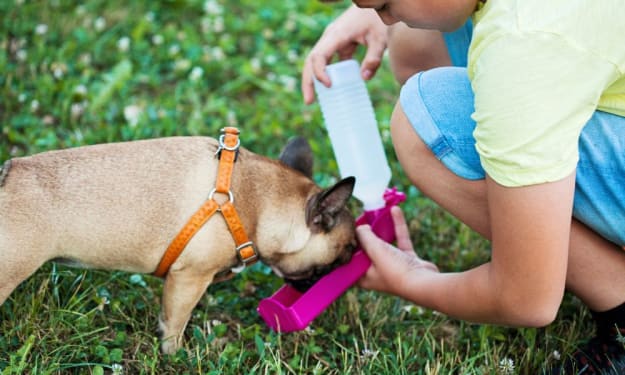Unsung Heroes
The impact of grassroots animal rescue groups

UNSUNG HEROES
The impact of grassroots animal rescue groups
By: Katherine Beam
The majority of animal shelters in Virginia are non-government funded, 501(c)3 not-for-profit organizations that offer a tremendous alleviation of the burden which the roughly 95 county facilities in the state have to endure. Most, if not all, of these private rescues were founded by groups of people or individuals who are passionately devoted to improving the standards of living and care of the animals within their community. In one of Wayne Pacell's (head of the Humane Society of the United States) speeches, he heralded the work and efforts of these grass roots organizations as being essential to the success of national groups' (such as HSUS) success in achieving their goals concerning animal welfare. A quick search on the internet will reveal that there are multiple rescue groups for every species of animal (Bunny Lu in Haymarket, VA only handles rabbit rescue, Alley Cats Allies in Alexandria, VA only deals with cats, etc.), and within those are groups that rescue only specific breeds of their chosen species (Thoroughbred Retirement Foundation (TRL) located in Middleburg, VA only rescues thoroughbred horses, or Virginia Great Pyranees Rescue based in Richmond, VA, only handles Great Pyranees or Great Pyranees mix dogs). These types of organizations serve to fill in where the government run facilities get overwhelmed or fall short in terms of the housing, knowledge and resources required to care for certain species of animal or particular breeds in any given species. The aim of this article is to highlight the work that is being done by 4 animal rescue operations in Virginia who each in their own way have taken on the job of rescuing the animals who are more challenging to rehabilitate and re-home.
The Middleburg Humane Foundation (MHF), Bully Paws Pit Bull Patriots (BPPBP), Equine Rescue League (ERL), and Caring for Creatures are four such organizations in Virginia that operate solely through private fundraising efforts and make an incredible difference in the lives of thousands of animals each year. Each of these organizations is unique and specialized in some way and their efforts and services have proven to be an invaluable asset within their respective communities.
MIDDLEBURG HUMANE FOUNDATION
www.middleburghumane.com
The Middleburg Humane Foundation is a non-profit animal shelter in northern Virginia that was founded by a court appointed humane investigator in 1994. They identify themselves as "a farm shelter specializing in the rescue and rehabilitation of abused, neglected, or otherwise 'at risk' animals, both large and small". MHF is unique in that it is a farm shelter that is able to house and care for horses and livestock as well as companion animals. It also differs from other private rescues in that they are able to intervene legally (with the same authority as local Animal Control) in situations of extreme abuse or neglect. In addition to humane investigations, their other programs include:
Adoption program: All of the shelters' residents are made available for adoption when they are ready. Because of the nature of MHF's work, many of the animals that come to MHF are in bad shape, both physically and emotionally, so often there is a long and expensive rehabilitation period before an animal is deemed suitable for adoption.
Equine Rehabilitation program: Equines, particularly those that have suffered any kind of abuse or neglect, have more complicated husbandry needs than most other animals. For this reason, MHF employs an Equine Rescue Program Manager whose job it is solely to handle all things equine, from intake to daily care to subsequent adoption.
Chained Dog Assistance program: MHF employees deliver food, water, treats and toys to many of the dogs in their area who live their entire lives on chains. MHF also makes sure that these dogs have adequate housing and bedding, and makes every effort to improve the overall quality of life for the animals in this program on a monthly basis.
Low Income Spay/Neuter and Medical Assistance program: MHF reserves a portion of their funds to provide veterinary care to animals in their community whose owners are experiencing financial hardships and are not able to afford veterinary care. These funds are primarily used for routine services such as vaccinations, routine testing, de-worming, spays/neuters, however, MHF will assist with emergency veterinary expenses as well.
BULLY PAWS PIT BULL PATRIOTS
www.bullypaws.org
Bully Paws Pit Bull Patriots is an all volunteer and foster home based 501(c)3 not-for-profit rescue who's 3 hubs operate out of northern and central Virginia. BPPBP was founded by a small group of dog lovers who recognized that the breeds of dog that are considered to be "bully breeds" (pit bulls, pit bull mixes, Staffordshire terriers, American bull dogs, Rottweilers, Mastiffs, etc.) are at a much higher risk of being euthanized in shelters than other types / breeds of dog. Many localities in the mid-Atlantic states have breed specific legislation (referred to as BSL) in place, making it forbidden for those county's shelters to adopt out pit bulls or pit bull mixes. If an alternative placement cannot be arranged, those facilities are often forced to euthanize otherwise healthy and adoptable dogs solely based on the shape of their head and their overall body type. Bully Paws exists to give as many of these dogs as possible a second chance at life and to serve as an advocate, for all "bully" breeds. As stated on their website, their goal "is to focus on pulling highly adoptable dogs who will serve as true ambassadors for the breed". In addition to their foster and adoption program, they also assist pit bull owners with a wide range of veterinary services, as well as assisting members of their community in overcoming some of the specific challenges that bully breed owners face such as finding rental housing without breed restrictions and securing homeowners insurance policies with "pit-friendly" insurance companies.
EQUINE RESCUE LEAGUE
www.equinerescueleague.org
The Equine Rescue League (ERL) is an equine only 501(c)3 rescue that operates on "Promise Kept Farm", a 20 acre facility located in Northern Virginia. It was founded in 1990 by a mother - daughter team in a part of the country where horses almost outnumber people in population. Horses are far more expensive and complicated to care for than other animals, and because of this they are frequently the victims of abandonment, neglect, and abuse. Horses come to ERL from a variety of situations, and although ERL employees are not court appointed to proactively intervene legally in the way of confiscating animals or proceeding with criminal prosecution, they are essential to their local animal control agencies in that they provide a place for equines who are part of a cruelty case to be housed and cared for after they've been seized by the authorities. Most county animal shelters, even those in the heart of horse country, do not have the facilities necessary to handle equines and livestock, and this poses a huge challenge to ACOs when they are handling a cruelty investigation that involves farm animals. Essentially, without private facilities such as MHF and ERL that are equipped to care for horses and other farm animals, animal control officers would not be able to do a big part of their job, which is to enforce animal welfare laws for all animals, both large and small, in their jurisdiction. In a message written by one of ERL's founders on their website, it is stated that "the ERL provides a haven for mistreated, neglected, and abandoned horses, ponies, donkeys and mules. We also take in horses whose owners can no longer, for whatever reason, care for them properly. In essence, ERL provides the same services as a humane organization to house pets, just on a 'larger' scale".
CARING FOR CREATURES
www.caringforcreatures.org
Caring for Creatures is a private, no-kill animal shelter founded in 1988 on a 157 acre property in central Virginia and is now home to an average of 200 cats and dogs. What sets CRC apart from other rescues is that they are on a very short list of organizations that will take in and care for FIV (Feline AIDS) and FeLV (Feline Leukemia) positive cats. One of the buildings at their facility features an FIV ward and a separate FeLV ward where infected (but otherwise healthy) cats are housed in large playrooms that have small doors to give the cats access to a screened in porch and fresh air. Although CRC considers themselves to be generally a "no-kill" shelter, that policy refers to the fact that they do not need to euthanize animals for space. If an animal is suffering due to an untreatable or uncorrectable medical condition, CRC will have them humanely euthanized. Taking on these cats is an example of how CRC is one of Virginia's animal rescue facilities that, like MHF, ERL and Bully Paws, accepts the challenge of helping the animals that very few others are either willing or able to assist. In addition to this program for which there is such an incredible need, this organization also fosters community outreach programs where the emphasis is educating the animal owning public on how to better care for their animals because they believe that "behind every unwanted litter and behind every neglected, abused, or abandoned animal, there is a human who has made a misguided or uneducated choice". CRC's community outreach and educational programs work to aid members of the community in being able not only to keep, but to take better care of their pets.
Furthermore, one of the most important ways in which county facilities can be assisted is by efforts made to prevent animals from needing to be surrendered to the shelter in the first place. Any endeavors in the community which focus on preventing unwanted litters from being born, and ensuring that those already born never have to be surrendered to a shelter, are essentially just as valuable and beneficial means of support as are donations and volunteers. Space, food, and veterinary care do not need to be provided for what's not coming in, simple as that. The creation and implementation of such endeavors is another way that these four organizations, and hundreds of others in Virginia, provide vital relief to the government run facilities.
These organizations exist because of individuals who have taken it upon themselves to be proactive in correcting the negative issues facing the animals in their respective communities, and without them, the government run facilities simply would not be able to shoulder the burden. There is a famous quote of Mahatma Ghandi's that states "the greatness of a nation and it's moral progress can be judged by the way it's animals are treated", and that "greatness" and "moral progress" of which he spoke are concepts that are reflected in the work of these incredible grass-roots organizations.
SOURCES
www.middleburghumane.com
www.equinerescueleague.com
www.caringforcreatures.com
www.bullypaws.org
About the Creator
katie beam
I have lived an entirely atypical life in which every aspect has been completely unique and unusual in every way. I have had a 30 year love affair with the written word that is as passionate today as when it began.
Enjoyed the story? Support the Creator.
Subscribe for free to receive all their stories in your feed. You could also pledge your support or give them a one-off tip, letting them know you appreciate their work.






Comments
There are no comments for this story
Be the first to respond and start the conversation.